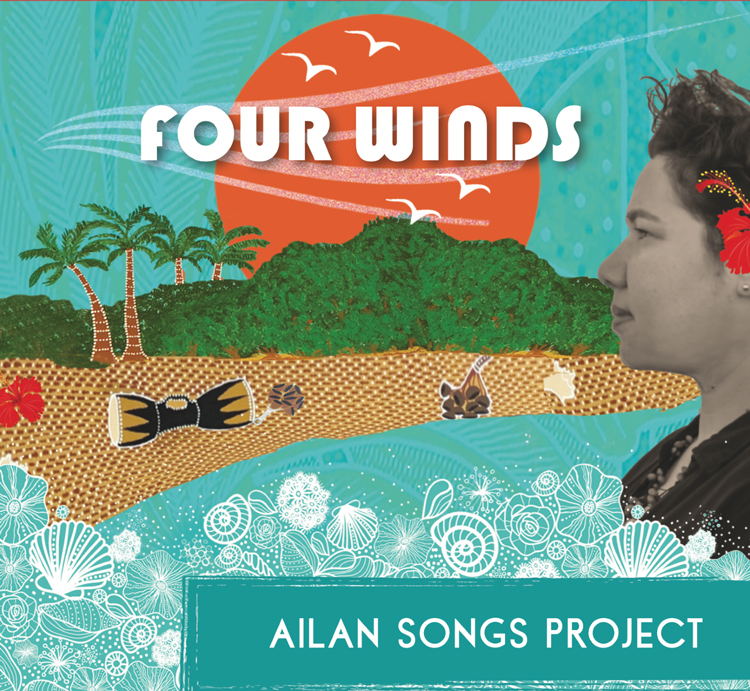Jessie Lloyd Ailan Songs Project – Four Winds – Historical songs from the Torres Strait (2022)
Composer and performer Jessie Lloyd is a passionate song-keeper of Australia’s Indigenous music from yesteryear and the stories behind it. Her 2019 Mission Songs Project revived songs from last century, when Aboriginal people were forcibly removed from their homelands onto whitefella-managed missions and settlements. One of the nation’s two Indigenous flags represents the Torres Strait Islands (TSI).
Ailan Songs Project presents songs from the TSI (known to locals as Zenadth Kez) where Polynesian influences color the melodies. Daughter of musician Joe Geia, (famous for the iconic hit ‘Yil Lull’) Lloyd continues a practice of fusing old and new. Songlines and Language from past millennia feature alongside post-colonial tunes with the addition of modern melodic influences. Field recordings are given a contemporary make-over.
Throughout history, hundreds of Indigenous languages have been spoken, from the red center to southern forests and the vast coastline. Ancient traditions of story, song and dance are recognized by didgeridoo (or ‘yidaki’), clap sticks and chants. Today, young descendants master guitars, keyboards, tech wizardry and rap. But between the Dreamtime and the digital age, a rich fusion of influences were introduced from the USA, Hawaii, Papua New Guinea and neighboring shores. A Kriol cultural blend emerged.
Lloyd’s collaborative 2019 work recorded popular songs from the missions during the twentieth century occupation of Aboriginal land. Ailan [Island] Songs Project turns our attention to the far northern islands with a delightfully tropical setlist. Lilting sounds evoke celebration. Slower tempos represent heavy hearts. Instrumentation includes ukulele, Kulap bean seed pods, Warup and tharam drums, pedal steel guitar, brass and piano accordion. Composers are credited where known (others lost or disputed) with embellishments from Lloyd and guests.
A Polynesian flavor is immediately evident on infectious opening track ‘Oh TI’. The popular pearling era song celebrates Thursday Island (Waiben), where diving for the gems and sea cucumbers was perilous work. A core trio of female voices is led by Lloyd, with backing by local songwomen.
‘Black Swana’ honors the men who travelled for work to the mainland. In English and local Language, it’s a sweet and soulful reggae outing, piano-laced with a hint of ska. Adapted from American song ‘Navajo’ (performed by Black minstrels c.1905), the children’s song ‘Taba Naba’ is paired with a sit-down dance. Introduced to the Torres Straits via vinyl, sheet music or US visitors, the refrain ‘Nava Nava’ (‘my Navajo’) became ‘Naba naba, naba norem’ meaning ‘come, we go to the reef’.
Long before the Wild Colonial Boy was celebrated in song, the four winds of Australia were identified as North, South, West and South East. ‘Four Winds’ begins with the herald of a bu (conch) shell. The reggae-flavored original (by Lloyd & Louise Manas) looks back across generations of Islanders returning to their ‘Country’ from the cities, featuring a chant in the Kala Lagaw Ya language.
Stories recall the changes and constants in Islander life. Work, play, kinship and the elements. Star-crossed lovers, the displaced and homesick, soldiers serving in World War 2. Historic markers of Traditional Law, Christianity and the struggle for workers’ rights. (Lloyd’s grandfather Albie Geia, a brass band conductor, was a leader of the 1957 Palm Island workers’ strike.) ‘Pacifika Medley’ is a collection of four songs with a new verse introduced to final tune ‘Alofa E’. The addition was written by Lloyd, inspired by Jimmy Chi’s anthem ‘Nothing I Would Rather Be’ from his 1990 musical Bran Nue Dae.
As an Australian schoolkid, I was taught New Zealand Māori love song ‘Pokarekare Ana’. I don’t recall learning any Indigenous songs – or words – from my own country. It’s a privilege now to have another chance. ‘Lag PI’ tells of dance troupe members gathering from far and wide to share and preserve culture. Lloyd’s version adds locations to the original song, reflecting the journey taken in the album’s making. A musician’s journey to learn and to honor heritage. Respect for the land and its people. Always was, Always will be.
More information at www.ailansongsproject.com



yas queen